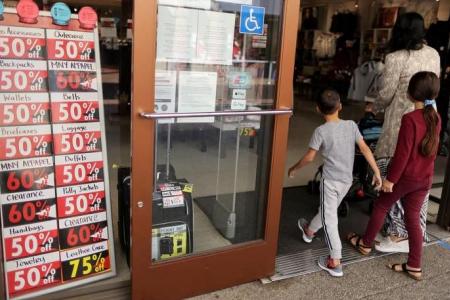With ballooning inventories, US retailers begin offering deep discounts
NEW YORK (REUTERS) - Major United States retailers that recently scrambled to restock shelves amid product shortages disclosed this week that their stores are now packed with too much merchandise, and some are even doing what was unthinkable a few months ago: discounting unsold goods.
It is a sign of possible more trouble to come for retailers amid soaring inflation and higher gas prices. With shoppers' tastes quickly shifting, many retailers now find themselves with a surplus of merchandise, driving up costs.
Costco Wholesale said its inventories ballooned 26 per cent in its fiscal third quarter ended on May 8 that included a "few hundred million dollars" of extra holiday merchandise and being a "little heavy" on small appliances and household items.
At Gap, a 34 per cent spike in inventories was caused by poor sales at Old Navy and longer transit times for goods, chief financial officer Katrina O'Connell said on Thursday (May 26).
Similarly, Macy's chief executive Jeff Gennette this week cited an "imbalance" in inventory. "Supply chain constraints relaxed," resulting in it receiving goods from overseas earlier "than we expected", he said.
Meanwhile, shoppers changed buying patterns, buying fewer home items while snapping up occasion-based clothing and other merchandise.
Average retail inventories in the US are rising at a faster pace than sales growth, according to Citi research on 18 retailers' first-quarter results as at May 22. At 11 of the 18, inventories rose by 10 percentage points more than sales did, according to Citi analyst Paul Lejuez. That is the widest gap since before the coronavirus pandemic began, illustrating a trend that began in March 2022.
During the supply-chain crisis, major retailers went on buying sprees, loading up on a range of merchandise and bulking up investments in merchandise so they would have enough goods in stock for shoppers flush with cash due to stimulus checks.
But the retailers' moves backfired, according to executives and analysts. With inflation soaring and fuel prices jumping, shoppers retrenched quite rapidly, buying less clothing, TVs and high-margin appliances.
That scenario is prompting retailers like Walmart and Macy's to clear out excess inventories by discounting more items and offering deeper promotions, a move that could erode margins.
Walmart CEO Doug McMillon said on its earnings call that it had started "aggressive" price rollbacks to boost sales of some higher-margin goods, including apparel.
As inflation lifted prices of everything from TVs to toothpaste, some lower-income consumers have curbed their spending, according to Walmart and Target.
Higher-income shoppers have shown resiliency, snapping up suits, gowns and footwear and spending more on services, economic data and results from retailers that cater to more affluent households showed.
Holding excess merchandise proves expensive as warehousing costs rise. Walmart store and distribution centres had 32 per cent more merchandise, Target had 43 per cent more goods compared with a year earlier and Best Buy had 9 per cent more merchandise in the first quarter, the retailers said.
Get The New Paper on your phone with the free TNP app. Download from the Apple App Store or Google Play Store now


